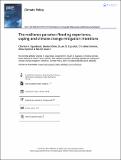Files in this item
The resilience paradox : flooding experience, coping and climate change mitigation intentions
Item metadata
| dc.contributor.author | Ogunbode, Charles Adedayo | |
| dc.contributor.author | Boehm, Gisela | |
| dc.contributor.author | Capstick, Stuart | |
| dc.contributor.author | Demski, Carolina | |
| dc.contributor.author | Spence, Alexa | |
| dc.contributor.author | Tausch, Nicole | |
| dc.date.accessioned | 2019-02-14T11:30:04Z | |
| dc.date.available | 2019-02-14T11:30:04Z | |
| dc.date.issued | 2018-12-24 | |
| dc.identifier | 257022189 | |
| dc.identifier | 3f66b534-6699-4a3b-99e5-0ea8782be4ad | |
| dc.identifier | 85059080671 | |
| dc.identifier | 000468501800004 | |
| dc.identifier.citation | Ogunbode , C A , Boehm , G , Capstick , S , Demski , C , Spence , A & Tausch , N 2018 , ' The resilience paradox : flooding experience, coping and climate change mitigation intentions ' , Climate Policy , vol. Latest Articles . https://doi.org/10.1080/14693062.2018.1560242 | en |
| dc.identifier.issn | 1469-3062 | |
| dc.identifier.other | ORCID: /0000-0002-9471-0673/work/52572469 | |
| dc.identifier.uri | https://hdl.handle.net/10023/17064 | |
| dc.description | This work was supported by Economic and Social Research Council [grant number ES/M005135/1]. | en |
| dc.description.abstract | Climate change is projected to increase the frequency, intensity and unpredictability of extreme weather events across the globe and these events are likely to have significant mental health implications. The mental health literature broadly characterises negative emotional reactions to extreme weather experiences as undesirable impacts on wellbeing. Yet, other research in psychology suggests that negative emotional responses to extreme weather are an important motivation for personal action on climate change. This article addresses the intersection of mental health and functional perspectives on negative emotions, with a specific focus on the potential that reduced negative emotional responses to extreme weather may also translate to diminished motivation to undertake climate change mitigation actions – which we term the ‘resilience paradox’. Using survey data gathered in the aftermath of severe flooding across the UK in winter 2013/2014, we present new evidence indicating that self-appraised coping ability moderates the link between flooding experience and negative emotions and thereby attenuates the indirect link between flooding experience and climate change mitigation intentions. We conclude that support for flood victims should extend beyond addressing emotional, physical and financial stresses to include acknowledgement of the involvement of climate change and communication of the need for action to combat future climate risks. | |
| dc.format.extent | 2151075 | |
| dc.language.iso | eng | |
| dc.relation.ispartof | Climate Policy | en |
| dc.rights | Copyright © 2018 The Author(s). Published by Informa UK Limited, trading as Taylor & Francis Group. This is an Open Access article distributed under the terms of the Creative Commons Attribution License (http://creativecommons.org/licenses/by/4.0/), which permits unrestricted use, distribution, and reproduction in any medium, provided the original work is properly cited. | en |
| dc.subject | Climate change | en |
| dc.subject | Extreme weather | en |
| dc.subject | Flooding risk | en |
| dc.subject | Resilience | en |
| dc.subject | GE Environmental Sciences | en |
| dc.subject | DAS | en |
| dc.subject | SDG 3 - Good Health and Well-being | en |
| dc.subject | SDG 13 - Climate Action | en |
| dc.subject.lcc | GE | en |
| dc.title | The resilience paradox : flooding experience, coping and climate change mitigation intentions | en |
| dc.type | Journal article | en |
| dc.contributor.institution | University of St Andrews.School of Psychology and Neuroscience | en |
| dc.identifier.doi | 10.1080/14693062.2018.1560242 | |
| dc.description.status | Peer reviewed | en |
This item appears in the following Collection(s)
Items in the St Andrews Research Repository are protected by copyright, with all rights reserved, unless otherwise indicated.

